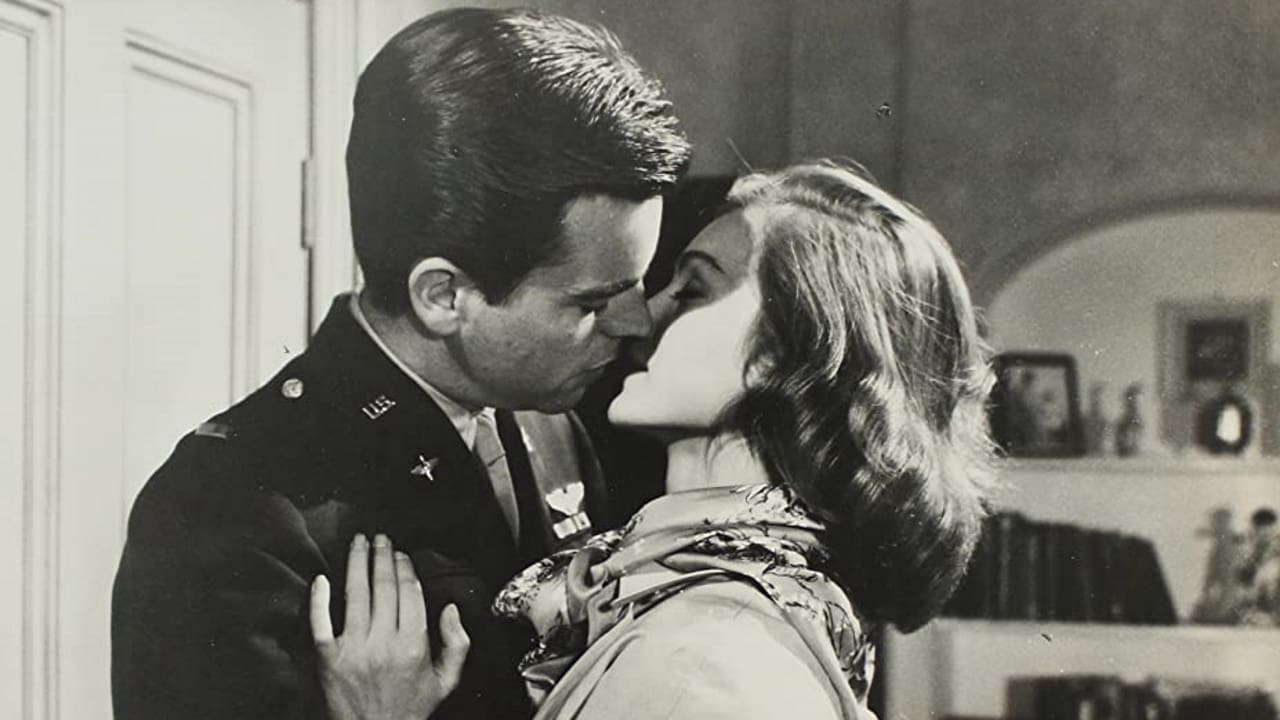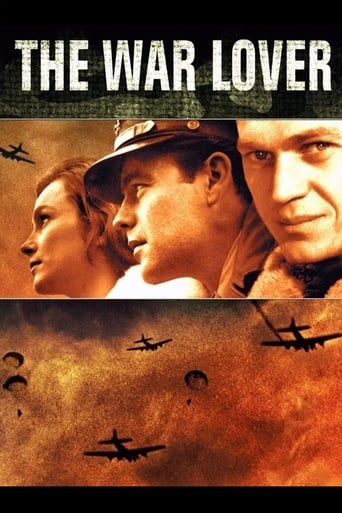



What a beautiful movie!
Lack of good storyline.
Amazing worth wacthing. So good. Biased but well made with many good points.
View MoreThe thing I enjoyed most about the film is the fact that it doesn't shy away from being a super-sized-cliche;
View MoreOnce they arm his B-17 "The Body" with bombs they become Buzz Rickson's (Steve McQueen) and he will allow no abuse to come to them until he reaches target even if it involves disobeying orders. Rickson is a war lover, emotionally dead on the ground, unless competing for his co-pilot's (Robert Wagner) girlfriend, but it is in the air over enemy targets is where he finds his real ecstasy. Arrogant, fearless, cynical, courageous, his crew knows he's short a full deck but it is the fearlessness that they bank on to get them back home.As in any film it appears (12 OClock High, Catch 22) the B-17 is the star, making its way through the flak in imposing formation, the crew in the chaotic interior trying to jell as they fight off German Messerschmitts. Using actual footage War Lover in the air is an intense watch especially with Rickson at the controls. On the ground things tend to get dull with Wagner and a dull Sally Ann Field playing out a mawkish romance to perhaps distract from the well cast McQueen's psycho hero. But it is McQueen's Rickson and his battered B-17 that give The War Lover the thrust that it has.
View MoreSteve McQueen plays a really screwed up bomber pilot, Buzz. Unlike most of these guys, Buzz LIKES that there's a war and finds the whole thing exciting and even fun! This doesn't bother his men during much of the film...he's very, very good at what he does and seems to lead a charmed existence. However, as the film progresses, it becomes obvious to several of the men that he really is a sociopath....a loner who likes to destroy things and has contempt for women. Nothing seems to get to him at all...until his last mission.In contrast, there's his co-pilot, Bo (Robert Wagner). As the film progresses, the two have a falling out and in many ways, they are different. However, he's no angel either when it comes to women. Handsome and likable, like Buzz, he's a bit of a user. But he does not love war and can't wait to go home.This film did a great job of fooling the viewer. According to IMDb, there were only three B-17s used in the film...and they made it seem like a lot more. Additionally, MOST of the aerial sequences are pretty good and the stock footage they used was better than normal in most cases (though the stuff later in the film wasn't nearly as good). There were only two serious problems I noticed (and I am a stickler for these details) were scenes where a plane exploded, as they were obviously just cheap models and could have been done better. There also was a BRIEF clip of a supposedly German fighter plane attacking at 94 minutes into the film...and it's actually an American P-38. In many ways, the film is an interesting portrait of the folks who flew the missions. I am pretty sure a reasonable number must have been like Bo and Buzz...and such attitudes must have proved helpful in war...and certainly NOT during peace time! Not a great film like "12 O'Clock High" (probably the best film about WWII bombers) but very good nevertheless.
View MoreConsidered a somewhat shallow adaptation of a John Hershey novel, this film follows the exploits of two American air force officers and friends in England during WWII. McQueen is an edgy, risk-taking Captain while Wagner is a more solemn and respectful Lieutenant. McQueen is consistently scrutinized by his superiors for his questionable decisions on air missions and Wagner frequently defends him until he starts to wonder if McQueen is doing what he does for the wrong reasons and in a way that is harmful too others, including himself. Meanwhile, Wagner has fallen for a refined English girl (Field) who seems to harbor her own fascination with McQueen. By the time of a massive air strike involving more than a thousand flyers, McQueen and Wagner's tension has reached the boiling point, though they may not survive the mission to settle it. McQueen, in a role that suits his rebel personality and misfit background, does a good job with his role, despite the occasional tendency towards overacting. His screen charisma is evident, however, throughout. Wagner is very good as well, though his acting style is almost completely different than McQueen's. His laconic, understated approach is a nice counterpoint to McQueen's more passionate and manic presence. Field comes off as pleasant, but remote, with a manner of speaking that never sounds completely human or real. (She sounds quite a bit like the bored, brainwashed wife in Trauffaut's "Fahrenheit 451.") Virtually everyone her character mentions having been close to was killed in the war, so it's a wonder that either McQueen or Wagner would want anything to do with her! She is appealing to a degree, but perhaps not arresting enough to inspire the sort of passion for her demonstrated by the men in the film. Musical comedy star Crawford has an early role, improbably (and unconvincingly) cast as a young American flyer. He cannot mask his accent. It's neat, however, to see him interacting with McQueen, who takes on an almost fatherly affection for him. It's a British-made film about Americans (and featuring quite a few Canadian actors in it) that doesn't always strike the right sensibility, but which paints a moderately compelling picture of the circumstances. The use of some authentic machinery and detailed military gear, as well as some arrestingly staged air battle sequences help hold viewer interest. Occasionally, a rotten special effect (notably a parachute scene) or a rear-projection shot that spoils the otherwise decent location filming springs forth to kick the audience out of the moment. Fans of McQueen will want to see his solid, anti-heroic work in an early leading role and fans of Wagner should be pleased as well, but others may find it a little choppy and unspectacular.
View MoreUnlike a number of those who have reviewed this film, I have never read John Hersey's novel. (Indeed, I only knew Hersey as the author of "Hiroshima" and did not realise that he was also a novelist). I caught it by chance because it was on television when I took a day off work last week, and decided to watch because it was a Steve McQueen film I had not seen before or even heard of. (McQueen is one of my favourite actors).The use of black-and-white film in the cinema survived for rather longer in Britain than it did in America, largely because colour television did not arrive in Britain until the end of the sixties, several years after it came to America. I have heard it suggested that "The War Lover" was made in black-and-white to allow the filmmakers to insert actual newsreel footage rather than recreating aerial dogfights as was done in a number of later films. The use of monochrome, however, is also a clue to the filmmakers' intentions. Even in Britain it would have been unusual for an action-adventure film to be made in black-and-white in the early sixties, and "The War Lover", although it is set against the background of the World War Two Allied bombing campaign against Germany, is not really an action picture along the lines of, say, "The Guns of Navarone" or "Where Eagles Dare". The aerial combat scenes, even if they are genuine, are less thrilling than those in later films such as "The Battle of Britain" or "Memphis Belle", or even an earlier one such as "The Dambusters". "The War Lover" is really a character study, a human drama of the sort for which the British cinema was still routinely using black-and-white at this period.Although the film was made in Britain by a British director, it is about the US Army Air Force rather than the RAF and the two leading roles are played by American actors. McQueen plays bomber pilot Captain Buzz Rickson, the "War Lover" of the title. Rickson is a brilliant pilot but is regarded with suspicion by his superiors because of his arrogant, insubordinate attitude. On one raid against the German submarine base at Kiel he blatantly disregards orders to abandon the mission because of bad weather, leads the aircraft under his command through a gap in the clouds, and succeeds in hitting the target. The men under his command, especially his co-pilot Lieutenant Ed Bolland, have mixed feelings about him.Bolland, played by Robert Wagner, is the other main character in the drama. Unlike Rickson, he is the conformist, by-the-book, type of officer. He has an idealistic belief in the rightness of the Allied cause, which means that he hates war but loves what he is fighting for. He suspects, however, that Rickson is indifferent to the cause he is fighting for but comes dangerously close to loving war for its own sake. Nevertheless, he chooses to carry on flying with Rickson, whose flying skills he admires, even giving up the chance of promotion when he is offered command of his own plane. (To complicate matters still further, both men are in love with the same girl, Daphne). The difference between the two men's characters is best summed up by the exchange between them when Rickson accuses Bolland of being afraid to die. Bolland admits that he is, but counters that Rickson is afraid to live.What gives this film its force is not so much the changing fortunes of war but rather the changing dynamics of the triangular relationship between Rickson, Bolland and Daphne. Daphne is played by the lovely Shirley Anne Field, who was one of the rising stars of the British cinema in the late fifties and early sixties but seemed to fade away later. Perhaps this was because the British cinema itself seemed to be fading away in the seventies, and because she never really adapted to Hollywood. Incidentally, her cut-glass accent, which one reviewer took exception to, would have been historically correct for an upper-class young woman in the forties. (I was also interested to see a young Michael Crawford as an American flyer). McQueen is particularly good as Rickson, one of his few unsympathetic roles but also one of his best. (In later films McQueen generally managed to keep the audience's sympathy, even when his character was on the wrong side of the law, as in "The Thomas Crown Affair"). McQueen receives good support from Wagner and Field, and while "The War Lover" may not be a particularly gripping war adventure (except perhaps for its tragic climax), it is certainly gripping when seen as a human drama. 7/10
View More